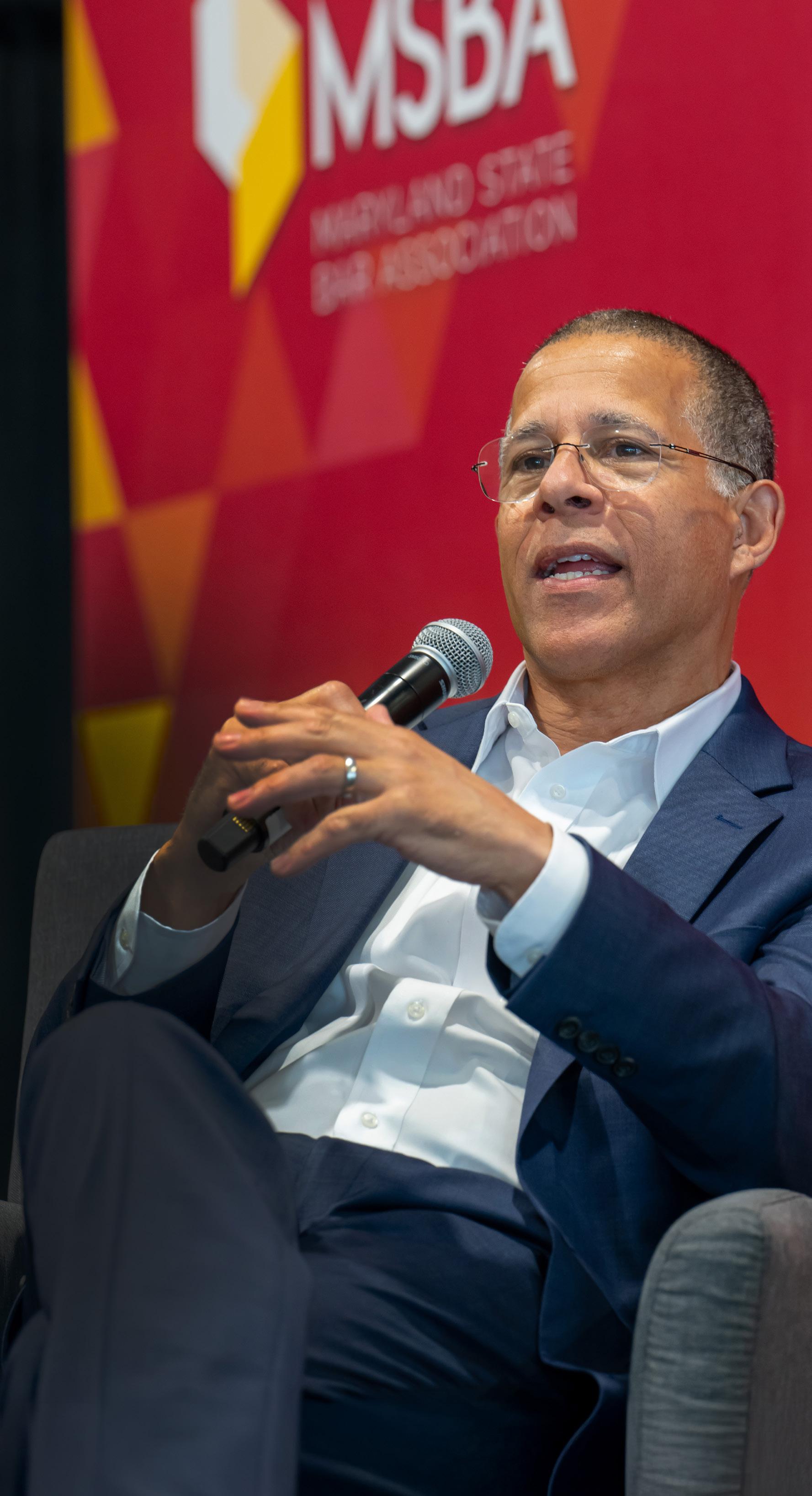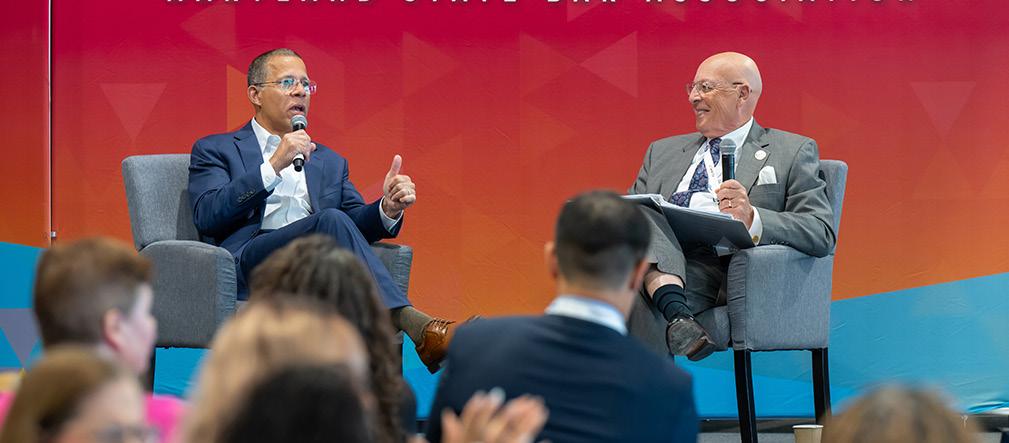Maryland Attorney General Anthony Brown Discusses Priorities and Initiatives at 2025 Legal Summit
MARYLAND ATTORNEY GENERAL Anthony G. Brown
was a featured speaker at the 2025 Maryland State Bar Association (MSBA) Legal Summit in Ocean City on June 5, 2025, in a fireside chat with MSBA President Raphael Santini. Brown, the first African American to hold this office in Maryland, shared insights into his role, strategic plan, legislative priorities, and advice for young attorneys.
Before becoming attorney general he served in Congress representing the 4th Congressional District (2017–2023), as Maryland’s Lieutenant Governor (2007–2015), and in the Maryland House of Delegates, where he was Vice Chairman of the Judiciary Committee and Majority Whip (1999–2007). Throughout his career, he has championed expanded protections for victims of domestic violence, abused and neglected children, and veterans, as well as initiatives to increase expungement eligibility, promote ballot access, and ensure LGBTQ rights. Since becoming attorney general he has established a Commission on Hate Crimes, and partnered with the Maryland Office of the Public Defender to create the Maryland Equitable Justice Collaborative, dedicated to reducing mass incarceration of African Americans and other marginalized groups. Brown is also a retired Colonel in the Army Reserve, with a distinguished record as an aviator and Judge Advocate General.
The Role of the Attorney General
Brown discussed his role as the chief legal officer of the state, emphasizing that he and the 1,040 employees of the Office of the Attorney General (OAG) work for the people of Maryland. The OAG constantly balances the responsibilities and challenges of defending and protecting Maryland’s state agencies and the state’s institutional interests with serving the public. But the office's staff members never lose sight of the fact that they work for the people. “It is a challenging job,” said Brown, “and noble work” which gives him “a great appreciation for the job.”


OAG's Strategic Plan and Mission
Brown launched the OAG’s Strategic Plan with five key priorities, all guided by the mission to "advise and represent State government, vigorously enforce the law to safeguard the rights of the people, and promote justice and equity for all Marylanders." These five priorities include strengthening public safety and law enforcement; protecting consumers, workers, and promoting fair business practices; upholding civil rights and promoting equal justice; ensuring good stewardship of public and natural resources; modernizing the OAG and improving organizational efficiency, including the adoption of AI.
The OAG also developed metrics to measure the quality of their work. Brown highlighted Governor Moore’s motto, "leave no one behind," as a guiding principle of equity in the OAG’s strategic planning. Because, Brown said, “equity does not equal race, but that’s part of it. . . it’s ensuring that every Marylander has equal access to opportunities, and government services, and that the outcomes and the impacts of what we do in government are equitably felt both on the upside and the downside for the people of Maryland.”
Legislative Priorities for 2025–2026
Brown outlined his legislative priorities for 2025-2026, focused on safeguarding the well-being and rights of Marylanders through targeted legislative action.
Key priorities include protecting vulnerable adults in assisted living care facilities. He is proud of the fact that during the 2024 session his office was successful in getting the General Assembly to extend the Patients Bill of Rights to long-term care facilities. Additionally, Brown said he will be pursuing legislation requiring nursing homes to install video cameras to protect the vulnerable. The video cameras will act both as a deterrence for abuse and assist with prosecution of violators.
Federal Accountability Unit
Brown established a federal accountability unit, composed of professionals so that his office can protect Maryland and Marylanders from any new adverse federal actions. The unit consists
of six attorneys and paralegals that operate within a multi-state coalition of attorneys general. They collaborate every day with their colleagues around the country as the administration issues executive orders and repeals rules. Brown said his office will bring “no lawsuits based on politics, but only on cases that hurt Marylanders,” e.g. teacher certification program. Recently, the group was successful in getting a preliminary injunction to prevent the federal government from dismantling AmeriCorps. The attorney general group has filed a total of 23 lawsuits.
Expanding Civil Rights Authority
Brown sought and obtained legislative authority from the General Assembly to bring civil rights and discrimination lawsuits. This led to the establishment and expansion of the attorney general’s authority and the hiring of civil rights attorneys to pursue public accommodations, employment, and housing discrimination cases.
Recruitment and Retention of Skilled Attorneys
To attract and retain skilled attorneys, Brown secured salary increases for the OAG from the Governor and General Assembly. In turn, the salary increases have helped with recruitment. The OAG is proactively recruiting in higher education and law schools. Additionally, the OAG focuses on attorney training, implementing continuing education requirements, and becoming an enterprise member of the Maryland State Bar Association for enhanced legal education opportunities for their attorneys.
Advice for Young Attorneys
Brown advised young attorneys and law students to focus on developing litigation skills, technology skills, and non-tangible soft skills. He also emphasized the importance of being a team player, leading, and being resourceful. Most importantly, Brown stressed the necessity of striking a work-life balance and understanding that this balance will change over time and will be different for everyone. “Strike a balance, and commit to it,” he said. If you can’t do that as a young person, you are going to have difficulty doing it as an older, more experienced lawyer.
